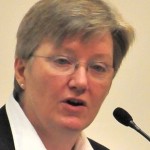2014 Consultation: Rahner and Ecumenism Today
Ecumenism was the topic of the 2014 Karl Rahner Consultation, which took place at the Manchester Grand Hyatt in San Diego on June 7. Jon Nilson (Loyola University Chicago) convened and moderated a panel discussion entitled “Rahner and Ecumenism Today: Is Unity Still ‘An Actual Possibility’?” At the end of his life, said Nilson, Rahner “was still arguing that Church leaders bore serious responsibilities” for ecumenical unity and that “Christianity divided was too weak to confront contemporary secularism effectively.” The phrase “an actual possibility” was the subtitle of a 1983 book by Rahner and Heinrich Fries entitled Unity of the Churches. The two authors maintained that visible Christian unity is realizable today. They showed how major obstacles to unity, such as the papacy and ordained ministry, need not be such, provided that they be understood in new but still faithful and orthodox ways. At the June 7 consultation, this thesis was discussed by a panel including Catherine Clifford (St Paul University, Ottawa), Richard Lennan (Boston College), and Jill Raitt (University of Missouri).
Unity of the Churches garnered attention, said Nilson, “but Rahner’s death and Cardinal Ratzinger’s hostility pushed it off the ecumenical radar.” Since then, new obstacles have arisen. An example is today’s disputes over moral issues, Nilson said. Moreover, ecumenism has been largely Eurocentric; today’s Christianity is not. The hypothesis of the panel was that Rahner still has much to teach Christians about the ways and means to the visible unity of the Church. Each panelist addressed the question, “What, if anything, does Rahner still have to contribute to the cause of Church unity?” A discussion followed. For further information on the panel discussion, see Ecumenism Today. All of the participants referred to Karl Rahner and Heinrich Fries, Einigung der Kirchen – reale Möglichkeit. Mit einter Bilanz ‘Zustimmung und Kritik’ von Heinrich Fries (Freiburg im Breisgau: Herder, 1983), and Jon Nilson, Nothing Beyond the Necessary: Roman Catholicism and the Ecumenical Future (New York: Paulist, 1995). The Karl Rahner Consultation took place within the annual convention of the Catholic Theological Society of America. The theme of the convention was“Identity and Difference, Unity and Fragmentation.” Click to learn about the 2014 Rahner Breakfast, which featured presentations by Brandon Peterson and Leo J. O’Donovan.
Panelist Contributions
The three panelists at the 2014 Rahner Consultation shed light on The Unity of the Churches, the book of 1985 written by Rahner and Fries.
Ecumenical Perspectives from the Vatican and the World Council of Churches By Jill Raitt, University of Missouri Raitt’s contribution examined the rather pessimistic view of ecumenism from Michael Kinnamon, past Executive Secretary of the World Council of Churches and (from 2007-11) the General Secretary of the National Council of Churches. She compared Kinnamon’s viewpoint with the optimism expressed by Walter Kasper, who was President of the Pontifical Council for Promoting Christian Unity from March 2001 through June 2010. Raitt examined Kasper’s 2010 publication, Sacrament of Unity: The Eucharist and the Church. There Kasper compares “churches of the Word” with “churches of the Eucharist,” and considers whether their Eucharistic theologies support a substantial presence. For further information, see Raitt’s Ready or Not?
An Ultimate Resolution of Disputes? By Richard Lennan, Boston College  Some Catholic critics of Rahner and Fries, including Cardinal Ratzinger, dismissed Unity of the Churches at the time of its publication, said Lennan. They considered it an ill-judged attempt to promote Christian unity at the expense of Christian truth. For the critics, the Rahner-Fries proposal was unrealistic in arguing that unity did not require ultimate resolution of the conflicting claims to truth expressed in the doctrines of the divided churches. Lennan placed Unity of the Churches in the context of the wider corpus of Rahner’s post-Vatican II writings on ecumenism. In Rahner’s assessment, the church needed to shift its emphasis away from doctrinal disputes that had their origins in the Reformation. Lennan asked whether Rahner’s focus on context as a determining factor in ecumenism was a denial of truth or a prophetic insight. For further information, see Lennan’s Truth and Christian Unity.
Some Catholic critics of Rahner and Fries, including Cardinal Ratzinger, dismissed Unity of the Churches at the time of its publication, said Lennan. They considered it an ill-judged attempt to promote Christian unity at the expense of Christian truth. For the critics, the Rahner-Fries proposal was unrealistic in arguing that unity did not require ultimate resolution of the conflicting claims to truth expressed in the doctrines of the divided churches. Lennan placed Unity of the Churches in the context of the wider corpus of Rahner’s post-Vatican II writings on ecumenism. In Rahner’s assessment, the church needed to shift its emphasis away from doctrinal disputes that had their origins in the Reformation. Lennan asked whether Rahner’s focus on context as a determining factor in ecumenism was a denial of truth or a prophetic insight. For further information, see Lennan’s Truth and Christian Unity.
Ecumenism and Doctrinal Authority  By Catherine Clifford, St. Paul University, Ottawa Clifford examined two theses by Rahner and Fries. Their first thesis, she said, was that the fundamental truths of faith expressed in Scripture and in the creeds provide a sufficient basis for ecclesial unity. Their second, related thesis, was that the confessional expression of that faith in the “binding dogmas” and confessional statements of ecumenical partners should be recognized as consonant with those fundamental truths, even if not imposed upon them. These two theses have been sorely tested in by the evolution of the churches in recent decades. Catholic magisterial pronouncements have tended toward doctrinal maximalism, said Clifford, while Reformation churches show an increasingly ambivalent attitude to their own “historic” expressions of faith. The normativity of creedal and confessional affirmations is less clear in the movement of third wave Christianity represented by Evangelical and Pentecostal communities, Clifford added. The complex question of doctrinal authority, in particular the normativity of the creeds and their relation to confessional expressions of faith, remains at the heart of theological ecumenism and the challenge of ecclesial recognition in the twenty-first century. Clifford suggested that the proposals of Rahner and Fries offered insights into possible ways forward.
By Catherine Clifford, St. Paul University, Ottawa Clifford examined two theses by Rahner and Fries. Their first thesis, she said, was that the fundamental truths of faith expressed in Scripture and in the creeds provide a sufficient basis for ecclesial unity. Their second, related thesis, was that the confessional expression of that faith in the “binding dogmas” and confessional statements of ecumenical partners should be recognized as consonant with those fundamental truths, even if not imposed upon them. These two theses have been sorely tested in by the evolution of the churches in recent decades. Catholic magisterial pronouncements have tended toward doctrinal maximalism, said Clifford, while Reformation churches show an increasingly ambivalent attitude to their own “historic” expressions of faith. The normativity of creedal and confessional affirmations is less clear in the movement of third wave Christianity represented by Evangelical and Pentecostal communities, Clifford added. The complex question of doctrinal authority, in particular the normativity of the creeds and their relation to confessional expressions of faith, remains at the heart of theological ecumenism and the challenge of ecclesial recognition in the twenty-first century. Clifford suggested that the proposals of Rahner and Fries offered insights into possible ways forward.

